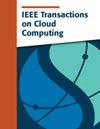Group Formation and Sampling in Group-Based Hierarchical Federated Learning
IF 5
2区 计算机科学
Q1 COMPUTER SCIENCE, INFORMATION SYSTEMS
引用次数: 0
Abstract
Hierarchical federated learning has emerged as a pragmatic approach to addressing scalability, robustness, and privacy concerns within distributed machine learning, particularly in the context of edge computing. This hierarchical method involves grouping clients at the edge, where the constitution of client groups significantly impacts overall learning performance, influenced by both the benefits obtained and costs incurred during group operations (such as group formation and group training). This is especially true for edge and mobile devices, which are more sensitive to computation and communication overheads. The formation of groups is critical for group-based hierarchical federated learning but often neglected by researchers, especially in the realm of edge systems. In this paper, we present a comprehensive exploration of a group-based federated edge learning framework utilizing the hierarchical cloud-edge-client architecture and employing probabilistic group sampling. Our theoretical analysis of its convergence rate, considering the characteristics of client groups, reveals the pivotal role played by group heterogeneity in achieving convergence. Building on this insight, we introduce new methods for group formation and group sampling, aiming to mitigate data heterogeneity within groups and enhance the convergence and overall performance of federated learning. Our proposed methods are validated through extensive experiments, demonstrating their superiority over current algorithms in terms of prediction accuracy and training cost.基于群体的分层联邦学习中的群体形成与抽样
分层联邦学习已经成为解决分布式机器学习中可扩展性、鲁棒性和隐私问题的一种实用方法,特别是在边缘计算的背景下。这种分层方法涉及在边缘对客户进行分组,其中客户群体的构成显著影响整体学习绩效,受到群体操作(如群体形成和群体培训)过程中获得的利益和产生的成本的影响。对于边缘设备和移动设备来说尤其如此,它们对计算和通信开销更为敏感。群体的形成对于基于群体的分层联邦学习至关重要,但往往被研究者所忽视,尤其是在边缘系统领域。在本文中,我们利用分层云边缘客户端架构和采用概率组抽样对基于组的联邦边缘学习框架进行了全面的探索。考虑到客户群体的特点,我们对其收敛速度进行了理论分析,揭示了群体异质性在实现收敛方面的关键作用。在此基础上,我们引入了组形成和组抽样的新方法,旨在减轻组内的数据异质性,增强联邦学习的收敛性和整体性能。通过大量的实验验证了我们提出的方法,证明了它们在预测精度和训练成本方面优于当前算法。
本文章由计算机程序翻译,如有差异,请以英文原文为准。
求助全文
约1分钟内获得全文
求助全文
来源期刊

IEEE Transactions on Cloud Computing
Computer Science-Software
CiteScore
9.40
自引率
6.20%
发文量
167
期刊介绍:
The IEEE Transactions on Cloud Computing (TCC) is dedicated to the multidisciplinary field of cloud computing. It is committed to the publication of articles that present innovative research ideas, application results, and case studies in cloud computing, focusing on key technical issues related to theory, algorithms, systems, applications, and performance.
 求助内容:
求助内容: 应助结果提醒方式:
应助结果提醒方式:


